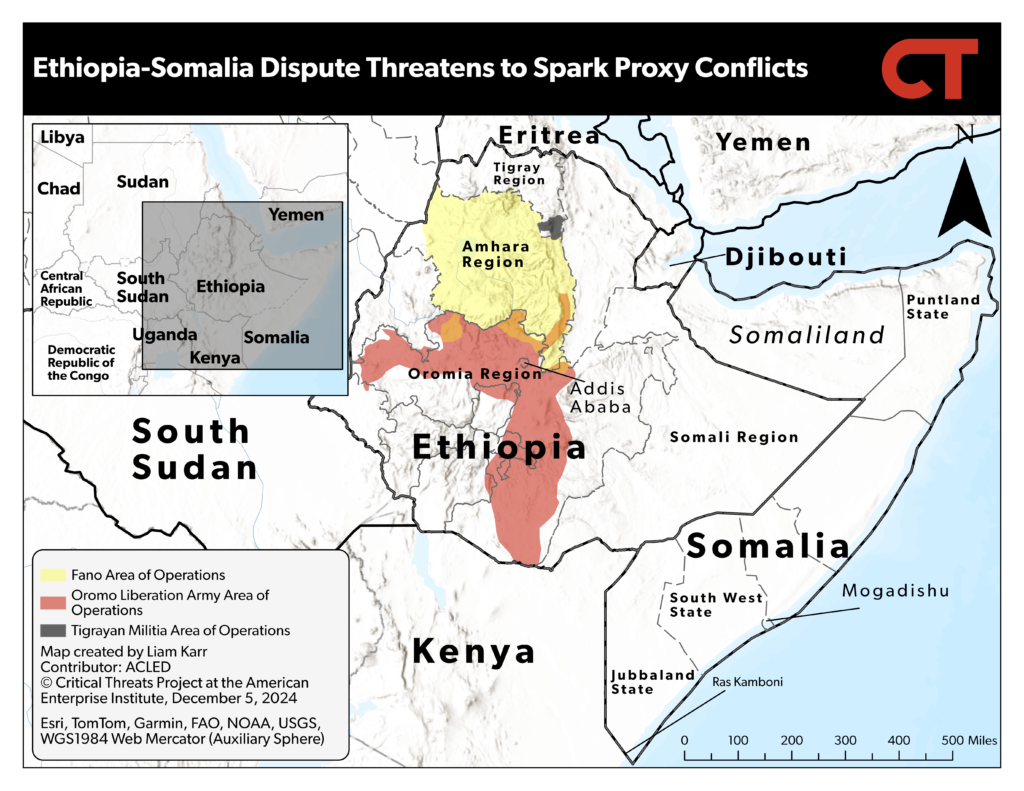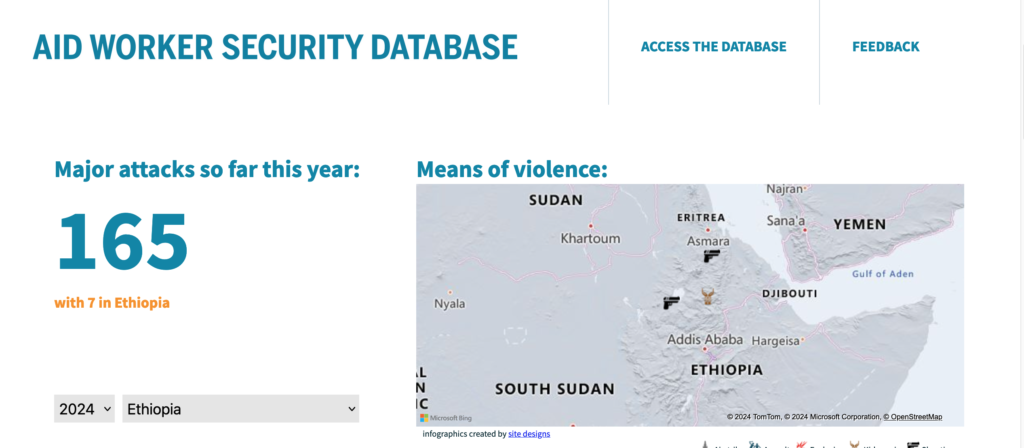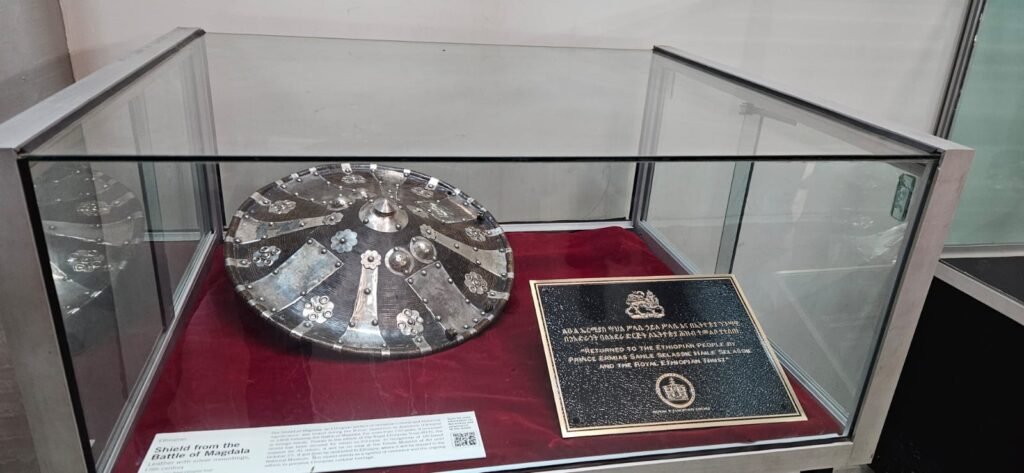
The Institute for the Study of War (ISW) has warned that confrontations between a semi-autonomous Jubaland and the Somali Federal Government pose a high risk of further internal violence and a proxy conflict between Somalia and Ethiopia.
The tension between Kismayo and Mogadishu came after Ahmed Mohamed Islam commonly known as Madobe was re-elected for a third term as president of the southern state of Jubaland on November 25, 2024, which is not recognized by the federal government of Somalia.
According to ISW, Jubbaland, and Somalia have been disputed over the format of the 2025 elections since October.
Following the election, Somalia’s government requested an Interpol Red Notice to arrest Madobe and thus the Banadir Regional Court in Mogadishu authorized the request, accusing Madobe of treason and revealing classified information to foreign entities.
In response, the cabinet ministers of the State of Jubaland in Kismayo derecognized the Federal Government of Somalia in Mogadishu on November 28, 2024.
A semi-autonomous Jubaland derecognizes the Somali government
ISW, in its latest research report, has warned that Jubaland and Somalia “may engage in further limited clashes in the coming weeks.”
“Both sides have warned of the potential for continued violence in Ras Kamboni,” ISW emphasized, reminding a 15-day deadline of Madobe which was given on November 29, 2024, to Somalia to withdraw its military forces from Ras Kamboni.
ISW recorded the events that Somalia deployed additional troops to Ras Kamboni near the border with Kenya, on November 25 which led to an exchange of gunfire between Jubbaland and Somalia.
Somalia on Friday also accused Ethiopia of “interfering in its southern Jubaland region,” calling it “against the sovereignty and unity of Somalia,” AFP reported.
The Federal Democratic Republic of Ethiopia has not immediately responded to the accusation.
A former Turkish province, Egypt meets Ankara in Mogadishu, a few miles from the Ethiopian border
ISW has warned that “the overlapping local and regional disputes risk sparking a direct or proxy conflict between Ethiopia and Somalia with Egyptian backing,” indicating that Egypt has sent weapons and deployed troops to Somalia since signing defense deals with Somalia in August 2024.






The situation between Jubaland and the Somali Federal Government seems increasingly volatile, with both sides escalating tensions rather than seeking dialogue. The re-election of Madobe and the subsequent Interpol Red Notice highlight deep-seated mistrust and political divisions. ISW’s warning of potential proxy conflicts involving Ethiopia and Egypt adds another layer of complexity to an already fragile region. It’s concerning how external actors seem to be fueling the fire rather than promoting peace. Why hasn’t there been any international mediation effort to de-escalate this situation? Given the potential for widespread violence, isn’t it crucial for regional powers to prioritize dialogue over confrontation? How do you see this playing out in the coming weeks?
The situation between Jubaland and the Somali Federal Government seems to be escalating rapidly, and it’s concerning how this could lead to broader regional instability. The re-election of Madobe and the subsequent tensions highlight the deep-rooted political divisions in Somalia. It’s alarming that both sides are resorting to military posturing, especially with the deployment of troops to Ras Kamboni. The involvement of external actors like Ethiopia and Egypt further complicates the matter, raising the stakes for a potential proxy conflict. ISW’s warning about the risk of violence should be taken seriously, as it could have devastating consequences for the region. What steps can be taken to de-escalate the situation and prevent further conflict? It’s crucial to find a diplomatic solution before this spirals out of control.
This situation is undoubtedly complex and raises serious concerns about the stability of the region. It seems like the tension between Jubaland and the Somali Federal Government is escalating rapidly, and the involvement of external players like Ethiopia and Egypt only adds fuel to the fire. The re-election of Madobe, despite not being recognized by Mogadishu, appears to be a significant trigger. The accusation of treason and the Interpol Red Notice seem like extreme measures—are these actions justified, or are they politically motivated? The potential for proxy conflicts is particularly alarming, as it could drag in more regional and international actors. What steps, if any, are being taken to de-escalate the situation? The lack of immediate response from Ethiopia is also curious—does this silence signify caution, or is there something more strategic at play? Lastly, how do the people of Jubaland and Somalia feel about this growing conflict? It’s their lives and safety that are most at stake here.
The ongoing tensions between Jubaland and the Somali Federal Government are deeply concerning. It’s alarming how quickly the situation escalated after Madobe’s re-election, which Mogadishu refuses to recognize. The accusations of treason and the Interpol Red Notice seem like a heavy-handed approach that could further inflame the conflict. Jubaland’s decision to derecognize the federal government only adds fuel to the fire. The involvement of external actors like Ethiopia and Egypt complicates matters even more, raising the risk of a proxy war. ISW’s warning about potential clashes in Ras Kamboni is particularly troubling, as it could destabilize the entire region. Do you think there’s any diplomatic solution to this crisis, or is violence inevitable?
The situation between Jubaland and the Somali Federal Government seems to be escalating rapidly, and it’s concerning how this could lead to broader regional instability. The re-election of Madobe and the subsequent tensions highlight the deep-rooted political divisions within Somalia. It’s alarming that both sides are resorting to military posturing, especially with the deployment of troops to Ras Kamboni. The involvement of external actors like Ethiopia and Egypt further complicates the matter, raising the stakes for a potential proxy conflict. ISW’s warning about the risk of violence is a stark reminder of how fragile the region is. Do you think there’s any room for diplomatic resolution at this point, or is the path to conflict inevitable?
The situation between Jubaland and the Somali Federal Government seems to be escalating dangerously, and the involvement of external actors like Ethiopia and Egypt only complicates matters further. It’s concerning how quickly tensions have risen after Madobe’s re-election, especially with accusations of treason and the issuance of an Interpol Red Notice. The potential for proxy conflicts in the region is alarming, and the deployment of troops and weapons by external powers could lead to a full-blown crisis. It’s unclear how Ethiopia will respond to these developments, and their silence so far is worrying. Do you think there’s still room for diplomatic solutions, or is the region heading towards inevitable conflict? The international community should pay closer attention to this situation before it spirals out of control. What’s your take on Egypt’s involvement and its potential impact on the region?
The ongoing tensions between Jubaland and the Somali Federal Government are deeply concerning. The re-election of Ahmed Madobe and the subsequent accusations of treason seem to have escalated the conflict significantly. The involvement of Ethiopia and Egypt adds another layer of complexity to an already volatile situation. It’s alarming how quickly the rhetoric has turned into military posturing, with troops being deployed and gunfire exchanged. The potential for a proxy conflict could destabilize the entire region further. Why do you think diplomatic efforts haven’t been prioritized to de-escalate the situation? Surely, there must be a way to avoid more violence and loss of life.
This situation in Jubaland and Somalia is deeply concerning, especially with the potential for further violence and external involvement. The re-election of Madobe and the subsequent tensions with the federal government highlight the fragile nature of governance in the region. The involvement of Ethiopia and Egypt adds another layer of complexity, raising the stakes for a potential proxy conflict. It’s alarming how quickly the situation escalated, with military deployments and exchanges of gunfire. The lack of immediate response from Ethiopia leaves many questions unanswered. What role do you think regional powers like Egypt and Ethiopia should play in de-escalating this conflict? It’s hard to see a peaceful resolution without external mediation, but the risks of further intervention are equally troubling.
This is a complex and concerning development in the region. The ongoing tension between Jubaland and the Somali Federal Government could escalate into a larger conflict, especially with the involvement of external actors like Ethiopia and Egypt. ISW’s warning about the potential for proxy conflicts adds another layer of instability to an already volatile situation. It’s worrying that both sides seem unwilling to back down, and the recent military movements near Ras Kamboni suggest that clashes could intensify. The role of international players in fueling this conflict raises questions about their long-term interests in Somalia. What steps can the international community take to de-escalate the situation before it spirals out of control? How much of this conflict is driven by local grievances versus external interference? The upcoming weeks will be critical in determining whether peace talks can happen or if violence will dominate.
The ongoing tensions between Jubaland and the Somali Federal Government are deeply concerning. It’s alarming how quickly the situation escalated after Madobe’s re-election, especially with the federal government’s decision to issue an Interpol Red Notice. The potential for further violence in Ras Kamboni is worrying, and the involvement of external actors like Ethiopia and Egypt only complicates matters. It’s hard to see a peaceful resolution when both sides seem unwilling to back down. The lack of immediate response from Ethiopia adds another layer of uncertainty. Do you think there’s any room for dialogue to de-escalate this conflict, or is violence inevitable? The stakes are too high for this to be ignored.
The escalating tensions between Jubaland and the Somali Federal Government are deeply concerning. It seems like this conflict could spiral into something much larger, especially with regional players like Ethiopia and Egypt getting involved. I find it troubling that both sides are unwilling to compromise, and the involvement of external forces only complicates the situation further. The recent military deployments and accusations of treason make it seem like dialogue is being completely disregarded. What’s the endgame here? Is there any hope for a peaceful resolution, or are both sides too entrenched in their positions? I wonder if the international community is doing enough to mediate and prevent further violence. How do you think this will impact the people living in these regions, who are already suffering from the ongoing instability?